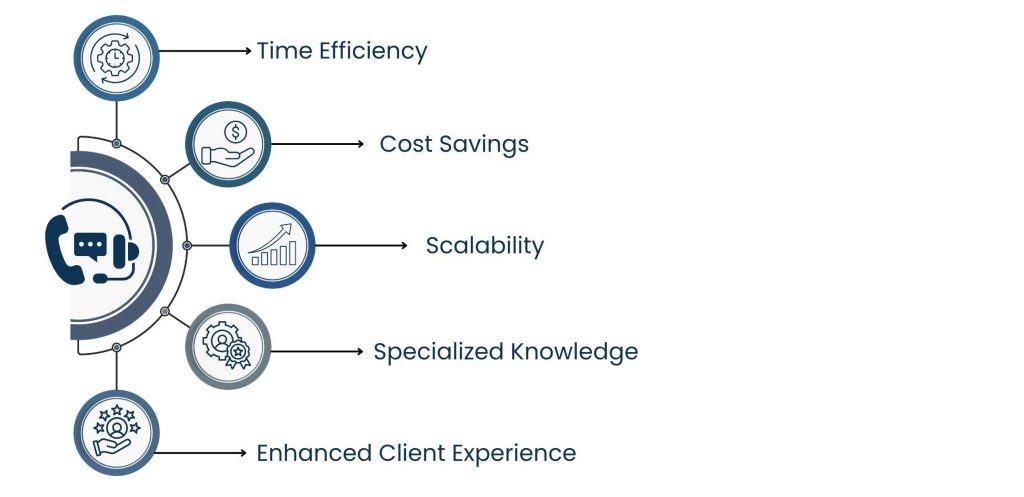Introduction
Virtual assistant for financial advisors is an invaluable new resource for niche financial service providers that need to stay efficient, compliant, and client-centric. It is a quiet revolution in financial services. Advisors today have a lot more to worry about than just finding the right mix of investments; they must understand new and evolving regulations, their clients’ expectations, and financial products that are increasingly hyper-personalized. For those who work in niches like high-net-worth portfolio management, ESG (Environmental, Social, Governance) investing, estate planning, or retirement advisory, the pressure may be unbearable.
Enter the virtual assistant. Understanding the unique needs of industries, compliance, and tools, VAs become force multipliers. They alleviate the bureaucratic hassle, streamline the process, and help advisors remain focused on client relationships and business development. In short, they enable financial professionals to do more with less stress and more focus.
What is a Virtual Assistant for Financial Advisors?
A financial advisor virtual assistant is a qualified, experienced professional, working remotely, who can take care of an array of support functions specific to the financial industry. These aides aren’t generalists. They’re skilled in handling the specific administrative, operational, and client needs that financial advisors- especially those in niche markets- face daily.
In a world of stringent compliance requirements, demanding clients, and fierce competition, every minute matters. This is where a virtual assistant can be a huge help. They aren’t advisers with licenses, but they know how to keep your practice running behind the scenes smoothly so that you can concentrate on clients, vision, and growth.
Financial VAs at a Glance

- Industry knowledge: Understanding of financial terms/terminology, SEC/FINRA rules, compliance programs.
- CRM Proficiency: Knowledgeable with Redtail tools, Salesforce, and other financial tools.
- Detail-Oriented: In finance, the details matter. VAs guarantee that documents are precise, reports are delivered on schedule, and that customer files are protected.
- Customer-focused: Knows how to manage calls professionally as well as client communication and coordination.
A really good VA isn’t just crossing items off a checklist–they understand the intricacies of financial advising and know how to improve the way you work so that you can get more clients and keep them satisfying clients.
The Scope of Their Role
A Virtual Assistant for Financial Advisors can be more than just an admin. They can handle client onboarding, create quarterly reports, update CRM data, coordinate with third-party service providers, and contribute to digital marketing activities if necessary. They are the link in the chain between internal productivity and the level of service they are providing to customers, once you get beyond the customer’s experiences with salespeople.

Through working with an informed VA, financial advisors can :
- Reclaim time to invest in high-touch client interactions.
- Eliminate expensive recruitment and training of in-house employees.
- Remain consistent in the delivery of service.
- Enhance responsiveness to reduce the waiting list for tasks.
Consider them the engine of your practice’s operation—running silently, smoothly, and with the precision of a professional in your system background.
Customization and Flexibility

All financial advisory practices are not created equal. A good virtual assistant will adapt to your processes, whether you focus on retirement, impact investing, or high net worth clients. They don’t just follow those leads on your list, but they figure out which ones meet your ideal customer profile and have learned how to sell to them. They learn preference, they match tone in their communications, and they become part of your process like a fully integrated team member, without affecting headcount.
Such a combination of industry knowledge, technical skills, and soft skills has become an invaluable asset in the fast-paced world of financial services.
Also Read: Virtual Assistant Services in Porto
Why Financial Services Niches Need Virtual Support?
And when it comes to niche financial services, they require a level of nuance and specificity and client attention that is quite different from what the average financial advising firm requires. In estate planning, ESG investing, retirement strategies, and tax-efficient wealth management, the stakes are high, and so is the volume.
A Virtual Assistant for Financial Advisors can become invaluable in this regard by taking over some parts of this burden, and thereby giving advisors a chance to spend more time with clients, and less with paper. Let’s look at how this applies in practice in an advisory role.
Transcending Client Expectations Keep in mind that challenging some clients’ thoughts and actions doesn’t show that you’re promoting dangerous decisions or choices.
And clients who want specialty financial services usually expect a high-touch, customized experience.

That means:
- In-depth onboarding procedures.
- Personalized communications.
- Frequent check-ins.
- Customized reporting and documentation.
This process of handling these expectations manually is not only exhausting but also inefficient. Here, a virtual assistant comes in handy to take care of those repetitive, time-consuming parts so you can remain client-facing.
Essential Operational Functions

A digital assistant can manage essential support Services like:
- Calendar & Email Management: Ensure every client gets responded to timely manner and that meetings flow smoothly.
- CRM Management: Ensuring that client information is always timely and accurate across staff members, systems, and ‘nodes’ in the network, such as Redtail, Salesforce, etc.
- Client On-boarding: Receiving KYC documents, creating accounts, and sending welcome kits.
- Document and Compliance Support: Formatting, proofing, and tracking needed filings and signatures.
- Performance Reporting: Tracking down data, formatting it, and scheduling reviews in a client-friendly manner.
- Digital: Social media scheduling, newsletters, and small content updates for better branding.
All of these services diminish your administrative overhead, improving your client’s experience and compliance integrity.
Specialized Support to Meet Tailored Needs
What Makes a VA Great for Niche Services What makes a VA great for niche businesses is their ability the dive into your unique segment.

For example:
- Estate Planning: They can keep tabs on trust distribution schedules and even schedule meetings with estate attorneys.
- ESG Investment Firms: They may help put together ESG impact reports and investor communication.
- Retirement Advisers: A VA can set up annual reviews and create retirement projection summaries.
Their specialization enables your firm to scale while preserving the quality of service.
Strategic Value Over Time

This hiring a VA investment is exponential. As they get to know your workflows and build client relationships, their value increases. And what begins as scheduling support can grow into full operational management, freeing you to focus more on advising and business development.
The bottom line is that niche financial services are focused and have to work without a hitch. A financial virtual assistant is the invisible partner who makes both feasible—productivity doesn’t slip while the standard of service does not drop.
The Key Advantages of Using a Virtual Assistant for Financial Advisors

1. Time Efficiency
Time spent managing calendars or formatting reports is time not spent on activities that could be yielding revenue. A VA takes care of the operational noise so financial advisors can focus on relationships and planning. This operational support, over time, adds up to concrete productivity improvements. Advisors said they feel less overwhelmed and are better able to focus on strategic work.
2. Cost Savings
If they can afford to hire a full-time, in-house assistant, this entails salary, benefits, office space, and onboarding costs. A VA provides professional help at a fraction of the cost, and you need only to pay for the hours or tasks required. It’s a lean, cost-effective means to receive high-level assistance without a long-term financial commitment. And you spare yourself the cost of sunk costs that come with employee turnover.
3. Scalability
The bigger your firm gets, the more responsibility you have. VAs offer scalable support. You can start small and expand support as you go, all without the burden of traditional hiring. Whether expanding into new markets or adding new service tiers, a VA is able to scale with your business. This is perfect for another growth-focused practice.
4. Specialized Knowledge
Most VAs also have a background or certifications in financial services. They understand FINRA, SEC rules, and the technologies they would work with (for example, CRM platforms, such as Redtail or Salesforce, and financial planning software, like eMoney or MoneyGuidePro). Their unique training minimizes the ramp-up time and reduces errors in critical processes. You have someone who understands your business day one.
5. Enhanced Client Experience
Prompt” handling, polished documentation, and effortless appointment-setting, in the end, lead to a more professional and responsive client experience. A VA makes sure these loose ends are tied up perfectly. This increases client retention, raises referral rates, and strengthens your firm’s credibility in the marketplace. Little touches, consistently applied: This is how change is made.
Niche-Specific Tasks a VA Can Manage
Owning a financial business is no joke, and there’s an array of tasks that need to be managed to run it successfully. From wealth creation planning to insurance and estate planning, no stone is left unturned.

1. For Estate And Legacy Planning:
- Preparing basic estate planning documents.
- Taking calls for attorneys and CPAs.
- Monitor trust documents and deadlines.
2. For ESG/Impact Investing Firms:
- Research ESG data and prepare reports.
- Content management for thought leadership blogs.
- Helping with investor relations.
3. For Retirement Advisors:
- Entering clients into financial planning software.
- Scheduling annual reviews.
- Checking on the retirement account and summarizing information.
4. For Tax Planning Advisors:
- Client tax document organization.
- Communicating with CPAs.
- Compliance and security of documents.
5. For High-Net-Worth Advisory:
- Addressing concierge-level client needs.
- Creating personalized portfolio presentations.
- Chasing after complex account openings and transfers.
Technology and Tools VAs Use

Virtual Assistants use an arsenal of tools to keep them connected, productive, and secure:
- CRMs: Redtail, Salesforce Financial Services Cloud.
- Communication: Zoom, Slack, Calendly.
- Project management: Trello, Asana, Clickup.
- Documentation: DocuSign, Adobe Acrobat, Microsoft 365.
- Compliance: Box, ShareFile, encrypted e-mail tools.
They often come trained on these platforms, allowing for fast onboarding and immediate contribution.
Also Read: Virtual Assistant Services in Setúbal
How to Onboard a VA Efficiently
Hiring a virtual assistant is only the first step. Once in this relationship, onboarding counts. A good onboarding is the foundation for a smooth transition and trust, and defines the path for continued partnership. It’s where expectations, systems, and workflows intersect.

1. Use Slack or email to check in daily
Enumerate the specific tasks that will be managed by the VA. Determine which systems they will access and what kinds of permissions they will have. The more explicit you are front and center, the quicker they can be productive. Clear role definitions also avoid confusion or overlap with your internal team.
2. Set Communication Standards for Remote Financial VA
Daily Check-In Use vehicles like Slack or email to check in daily. Define hours of operation and response times. Decide how frequently you will meet for status updates and what the best check-in procedure will be for urgent matters. Consistency of communication leads to a strong rhythm and mutual accountability.
3. Share Processes
Document your workflows. Train your VA using Loom videos, SOPs, or screen-sharing calls in a time-effective way. Guide them on tools, expectations, and challenges they can anticipate. The learning curve and the inconsistent performance of tasks can be lessened by visual and written documentation.
4. Provide Feedback
You must provide continuous feedback to foster better collaboration. Take time to celebrate and promptly address wins and gaps. Build in weekly or bi-weekly check-ins to assess progress and address any challenges early on. Positive reinforcement is what makes for high morale, but to level up fast, it’s also helpful to receive constructive criticism.
Possible Pitfalls (and How to Avoid Them)

1. Security Concerns
Financial data is sensitive. Utilize secure means of communication between trusted partners and restrict access to sensitive systems. Think NDAs and background checks. Additionally, ensure your VA is well acquainted with cybersecurity best practices and knows how to responsibly manage sensitive client data. It can be valuable to perform spot audits to make certain that data-handling protocols are in fact being followed.
2. Misalignment with Business Needs
Not every VA is a good fit for your business. You’ll want a candidate with financial services experience and a track record in your industry, solid references, and good communication. Cultural fit is also important — the person you pick should be someone with whom you have chemistry, and who shares your work style and values. A test project or interview can be a good gauge to measure compatibility before going all in.
3. Lack of Direction
VAs need clear instructions. Ambiguity leads to errors. Keep aligned using project management software and documented SOPs. Manage expectations and set clear targets consistently to keep performance at the same level. Regular check-ins can help avoid misunderstandings and keep priorities on track.
The Future of Finance: Virtual Support
With remote work having the potential to transform the future of business, virtual assistants are now a natural part of how financial advisors do business, particularly those who are specialists in niche markets. Whether it’s overseeing your operations or simplifying your client communications, virtual assistants provide a reliable, flexible, and scalable workforce.

These professionals blend seamlessly with your current process, keeping financial advisors in the high-level strategy and personalized client service business. With the right systems in place, VAs constantly become long-term partners that establish organization, consistency, and follow-through across every aspect of your business.
The advantages are particularly clear for niche providers. Whether your niche is ESG portfolios, estate planning, or high-net-worth advice, the right back-office support makes scaling simpler and service delivery nimbler.
If you want to gain a competitive advantage and reduce your workload, having an impactful Virtual Assistant for Financial Advisors may be the best business decision you make this whole year.
One such solution for connecting with vetted, industry-knowledgeable virtual assistants is Tasks Expert, a team gifted at pairing financial pros with expert VAs who GET their world.
Conclusion
In today’s fast-paced, regulation-laden financial world, a Virtual Assistant for Financial Advisors isn’t a luxury –it’s a strategic necessity. Whether it’s making operations more efficient and client communications more effective, or providing support for distinct services like ESG, estate planning, or retirement advice, VAs enable financial professionals to get back to what they care about most: growth and nurturing relationships. Their capacity for scalability, customization, and specialised expertise can be an invaluable asset for contemporary businesses.
If you’re sick of carrying the burden and being reactive, partner with a professional virtual assistant. Get in touch with Tasks Expert now to get the ideal VA for your financial advisory business and move your firm forward.
About Us
Tasks Expert offers top-tier virtual assistant services from highly skilled professionals based in India. Our VAs handle a wide range of tasks, from part time personal assistant to specialized services like remote it support services, professional bookkeeping service etc. Furthermore, it helps businesses worldwide streamline operations and boost productivity.
Ready to elevate your business? Book a Call and let Tasks Expert take care of the rest.









